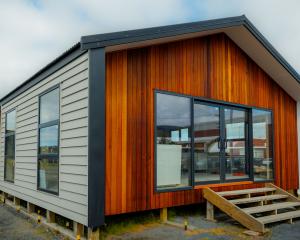
The Dunedin City Council is investigating how it could apply a new rating method to homes and rooms being rented out to visitors on internet services such as Airbnb.
A report prepared by the council's senior management accountant Carolyn Allan suggests a new rating category could be applied to some residential properties being used as accommodation.
There were at least 790 Dunedin properties, either the entire property or at least one room, advertised for short-term visitor accommodation during January.
Information showed about 41% of those properties were booked for fewer than 28 nights a year while 11% were booked for more than 180 nights, the report found.
Two options for how those properties could be rated will be presented to the council's rates and funding advisory panel on Tuesday.
The options included a new mixed-use rating category between residential and commercial, determined by the number of nights a property was rented for and the number of rooms available.
Under the possible changes, a property which had four bedrooms or fewer and was rented out between 29 and 128 nights would fall into the mixed-use category. Any more nights would mean it was commercially rated and any fewer it would be residential.
Other councils, including the Queenstown Lakes District Council, already have similar systems.
If the council decided to proceed with a new rating method, staff would need to refine and further develop the criteria and consider how properties would be registered, Ms Allan said.
Short-term rentals played an important role in Dunedin, particularly around major events such as the three Ed Sheeran concerts, and any possible consequences of a new rating method had to considered, she said.
Dunedin photographer Chris Sullivan rents out two spare rooms in his Mornington home and believes a targeted rate is not needed.
Unlike Queenstown and Rotorua, Dunedin was not a purely tourism-targeted destination, so residential homes provided an option not being offered in the city, Mr Sullivan said.
Before renting the rooms out, he approached the council and an accountant to make sure he was not breaking any laws or regulations.
Since the rooms were first advertised in November, they had been filled almost every night, he said.
Mr Sullivan said he understood the concerns commercial accommodation providers had, but would keep renting the rooms out as long as there were no regulations.
Otago Motel Association spokesman Neville Butcher said the association supported the council's moves to apply higher rates to those residential properties letting out rooms to short-term visitors.
Residential accommodation providers were marketed and operated exactly the same as commercial ones, but they were in a less regulated and lower-rated environment, which was unfair, Mr Butcher said.
Comments
I hope the Council won't be increasing the rates based solely on whether a property, or part of, is advertised as being available for accomodation.
Hotels, motels and BnB businesses are able to claim back expenses such as phone, electricity, insurance, cleaning, maintenance, booking fees and possibly other expenses, including rates, for tax purposes at the end of the financial year. Basically, gross profit less operating expenses equals nett profit or loss.
What hasn't been mentioned is the cost of staying at a residential property and how much it costs the owner to have someone stay. If the owner charges $50 per night and it costs them $50 in expenses, then the owner makes no profit ...
From the article, it seems as though the council want to put the rates up whether the owner of the property is making or losing money. If I advertise a room available for accommodation but have no one stay, why should I have rates increased ?
Mind you ... I supose the Council has to get a bit of money from somewhere to pay for some of "street art" that has appeared in Bath street recently ...
Just another prime example of council being greedy,street art is all well and good but what happens when it starts peeling of the walls and it will,I assume we will get to pay a second time to repair it,that's ok though the ratepayers are rolling in money it would seem,got to get that 850 million plus for more acts of stupidity somehow.
The idea of differential rating is that different types of properties require different levels of council services. So differential ratings are, in essence, a form of ‘user pays’. At least that was IMO the intention of the law permitting them. The idea that rates be used for business regulation or city planning invokes the wrong tool for the job. Owner-ocupied ‘digital homestays’ use incurs no greater costs to councils than normal family or flatting use of an average size home, eg 3 or 4 bedrooms. This use contributes to the local economy and showcases the city to visitors.
I remember when DCC killed off boutique BnBs by applying commercial rates to them, often preserved historic buildings. Just put them out of business. Pointless trying to attract visitors to Dunedin and not have enough accomodation. Unlike large-scale commercial hotels, owner-occupied digital homestays can affor to operate only in the busy season and be vacant for the rest of the year - complemetary business-wise, not competitive. Without this affordable option, many visitors simply wouldn’t come.












